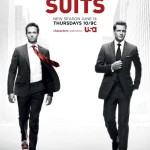Years ago I knew slightly a lawyer called Jonathan who, like me, engaged in amateur dramatics. The thing about this chap was that he was autistic, Asbergers to be precise. He approached amdram not for human interaction but as a technical feat to master words and movements. Equally, his successful law career was down to his anally retentive ability to master huge documents in a back room role. Put him before clients and he’d have clammed up, since the nature of Asbergers meant he could not communicate with empathy, specifically he could not read emotions in other people.
I mention this largely because the character of Mike Ross (Patrick J Adams) in Suits reminds me of Jonathan, with the exception that Ross is attempting to grapple with the art of client communication by virtue of his photographic (eidetic) memory and mastery of fine detail, though it’s fair to say he has far more trouble mastering the bizarre rituals of his own law firm.
The premise of Suits is that junior partner (soon equity partner) of law firm Pearson-Hardman Harvey Specter (Gabriel Macht) is required to take on an identikit Harvard law grad as an associate, but ends up taking on Mike, who flunked his law degree due to an association with drug pushers, and went on to make a living from it. Why does Harvey take on a man without qualifications? Because he can mould Mike to his own ends and values the anal retention, Harvey being a big picture game player, showman and womaniser rather than the sort of bloke who ploughs through acres of detail. Best of all, knowing Mike’s past gives him a head start in the power game.
In fact, this law firm is packed with game players – notably jealous rival junior partner Louis Litt (Rick Hoffman), a man with the creepiest cadaverous leer you’ve ever seen (spookily reminiscent of Mr Burns in the Simpsons) – and a variety of well-groomed thin white men in expensive suits. So, naturally, the über boss and co-owner had to be a token black woman, Jessica Pearson (Gina Torres.) Not that I’m being cynical, you understand (nudge nudge), but TV really is gloriously predictable in its minimal political correctness.
For most of series 1 Harvey treats Mike like shit, reminiscent of Kevin Spacey‘s loathsome characters in both Swimming With Sharks and Horrible Bosses, the clear inference being that to be wealthy, high-status and powerful are everything, otherwise you are scum of the earth. The newbie is initiated into the $2,000 suit ritual, routinely humiliated and taught lessons along way, but still comes back for more; gradually he becomes wiser and more confident as the corners are knocked off him. Granted they become gradually more like a knockabout double-act towards the end, but Harvey never lets Mike forget who’s boss.
You could forgive a lot and suspend much disbelief for a good engaging series, but compared with others I’ve seen recently Suits seemed a charmless exercise in the worship of ruthless Capitalism while presumably giggling at the stupid pranks of senior people treating their ambitious juniors like morons.
Perhaps this side of the pond we consider this abuse and naked greed to be vulgar, which is not to say that it does not happen there or here in real life, but ritual humiliation is not attractive to watch and in any case seniors really should know better than to behave like bullying five year olds. However, since the series has run and run it must have captured ratings somewhere, so presumably Americans have a higher tolerance for this brand of treatment than we Brits.
Ultimately it hones more sharks, not rounded and loyal employees, in the same way that people abused in childhood sometimes become abusers themselves – but evidently makes for mass market TV. Compare to another drama set in a law firm: Murder One series one created very real rounded characters with strengths and weaknesses, rivalries but also comradeship and team spirit. People were nurtured, sometimes with tough love, but the paternal boss was on their side and there when they needed help. Harvey expects room service 24 x 7 from his associate, not career development.
Ah but there is long-term character development, that without which no TV programme can expect to last beyond series 2, so you’d imagine Mike gradually bites back, saves his boss’s blushes and conflict and antipathy are gradually replaced by grudging mutual respect and loyalty? Well, yes to a point, but plot progression is achieved by making Harvey the dangerous fired opponent out for bitter revenge, but that’s for another review.
Naturally there is a wider cast of characters, including the inevitable glamorous women (Jessica notwithstanding, most are secretaries and paralegals) to act as love interest and just occasionally upstage the smart thin white men, though for the most part they seem there for effect and rarely to play a meaty role in the plot lines. The real issue is that I didn’t care one jot for or about any of them. The lack of sympathetic characters makes it hard to identify with anyone – even Mike the trainee shark who may or may not be borderline autistic falls between the two stools of aspiring to hero or anti-hero status, managing neither.
In 45 minute bite-size chunks Suits Series 1 feels much more like caricature than serious drama. It could almost be a cartoon series at times, so predictably formulaic are the characters and plots, whatever scenarios are thrown at them. You know the bad situation will turn out good and the two heroes will end up winning the case, hosannah! Frankly my attention began to wander during most of the episodes, the very antithesis of what creator Aaron Korsh will have been aiming for, though don’t weep for him – I doubt he did badly out of Suits.
Perhaps the writers have tried too hard to be clever and to come up with quotable soundbites, yet to my ear the scripts are somehow all glitz and glamour with a vacuous heart – certainly nothing like as zingy as Orange is the New Black, another Netflix show I recently reviewed. It’s not that you can’t enjoy Suits, just that to me it lacks soul. Instead it seems to me a slick and whizzy studio gig to elicit money, something it shares with the people it portrays.
If there is a moral to the tale, it is that you don’t need a college degree, least of all one with the Harvard label, if you all blessed with natural gifts of insight and intelligence, which in practice would not get you far in the legal profession – being illegal and all that. What the hell: with a heady dose of chutzpah the world is your bivalve.
But what do I know? Seems the world loves Suits so maybe the best advice is to watch and form your own impression. You may even agree with me!
Critical reception
Suits has gained favorable reviews throughout the course of the show, with many singling out Adams’ portrayal of titular character Mike Ross, as Adams was nominated for Outstanding Performance by a Male Actor in a Drama Series at the 18th Screen Actors Guild Awards. On the review aggregator website Metacritic, the first season scored 61/100, the second season scored 75/100, the third season scored 71/100 and the fourth season scored 80/100. Although the first season of the series only gained a moderately positive response from critics, the following seasons were very highly rated, making Suits a regular staple on the USA Network. The show also scored 8.8/10 on IMDB.
Season one
The first season of Suits garnered a score of 61/100 on Metacritic indicating generally favorable reviews. On Rotten Tomatoes, the first season scored a 7.1/10 rating, with the overall critical consensus stating: “Suits can feel bland and bloated, but flashes of sharp dialogue help bring the show to life.” The season was, although, panned by critics faring mixed reviews. Brian Lowry of Variety described the show as: “Slightly darker than most USA fare, Suits follows the channel’s pattern well enough, but breaks down when it comes to fulfilling the whole “Characters welcome” slogan.” Nancy DeWolf Smith of the Wall Street Journal, however, praised the show describing it as: “Even if Suits never strips off all of its comedic clothes, the glimpses of bare souls here are tantalizing.”













